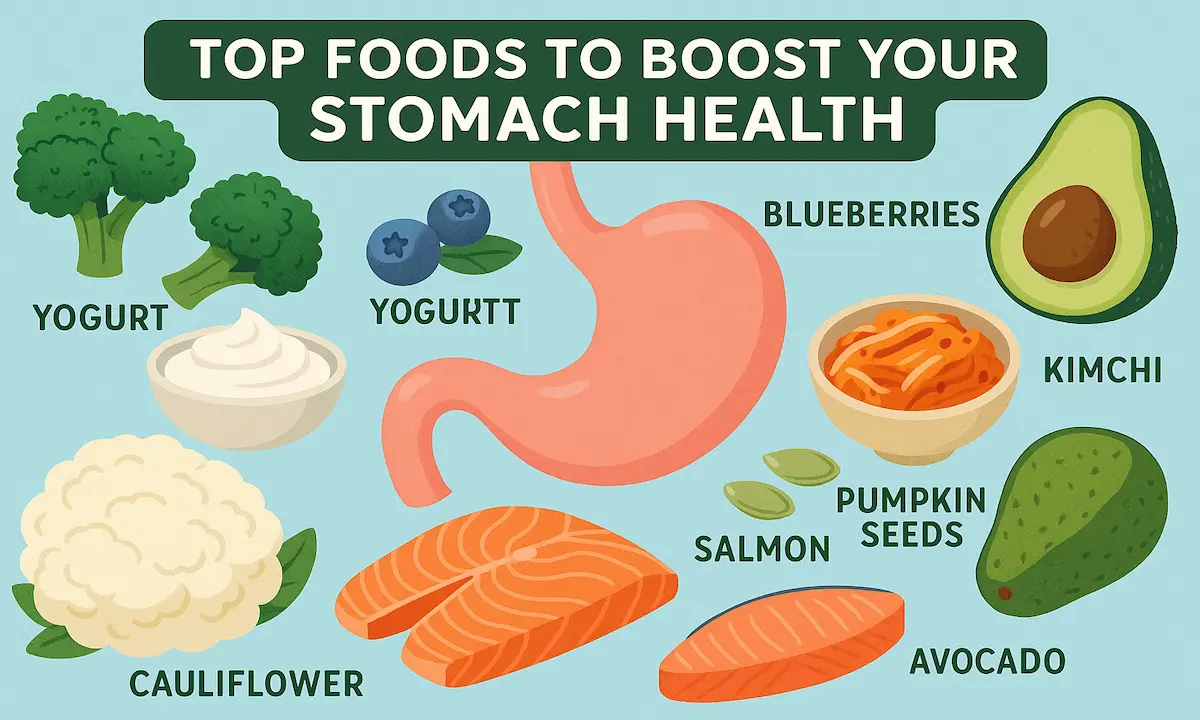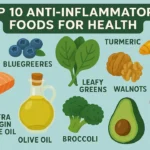Your stomach is at the heart of your health. It breaks down food, absorbs nutrients, and keeps your body running smoothly. When your stomach is healthy, you feel energized and comfortable. But poor stomach health can lead to bloating, pain, or worse.
The foods you eat play a huge role. Some soothe your stomach, while others cause trouble. Choosing the right ones can make all the difference. In this article, we’ll explore the best foods for a healthy stomach. You’ll learn why they work and how to add them to your diet.
Whether you deal with bloating, acid reflux, or just want better gut health, we’ve got you covered. By the end, you’ll have a clear plan to eat smarter and feel better. Let’s dive into the world of stomach-friendly foods and start your journey to better health!
Why Stomach Health Matters
A healthy stomach ensures smooth digestion. It helps you absorb nutrients effectively. This keeps your energy high and your body strong. Poor stomach health can cause discomfort. Bloating, acid reflux, or pain are common signs.
Serious issues like ulcers or irritable bowel syndrome (IBS) can also arise. The foods you choose directly affect your stomach. Some promote good bacteria. Others reduce inflammation. Making smart choices supports your gut and overall well-being.
A healthy stomach even boosts your immune system. It’s worth paying attention to what you eat.
Best Foods for a Healthy Stomach
These foods are gentle and packed with benefits. They support digestion and reduce discomfort. Here’s how to include them in your diet.
1. Yogurt
Yogurt is a probiotic powerhouse. Good bacteria balance your gut microbiome. This improves digestion and reduces bloating. Probiotics also strengthen your immune system. Choose plain, unsweetened yogurt.
Greek yogurt is high in protein and low in sugar. Avoid artificial sweeteners—they can irritate your stomach. Add fresh berries or honey for flavor. Eat yogurt as a snack or breakfast. Look for labels with live cultures for maximum benefits.
| Yogurt Benefits | How to Include It | Tips |
|---|---|---|
| Provides probiotics | Add to smoothies | Choose plain, unsweetened |
| Reduces bloating | Eat with fruit | Avoid artificial sweeteners |
| Boosts immunity | Use in dressings | Check for live cultures |
2. Bananas
Bananas are good for your stomach. They’re easy to digest and rich in fiber. Fiber keeps bowels regular. Bananas contain pectin, which helps with diarrhea. They’re also high in potassium for muscle health.
Read More: Why Checwifeswap Is Capturing Cultural Attention
Eat ripe bananas for the best results. Unripe ones may cause gas. Slice them into oatmeal or blend them into smoothies. They’re perfect for a quick snack.
| Banana Benefits | How to Include It | Tips |
|---|---|---|
| Easy to digest | Slice into oatmeal | Choose ripe bananas |
| High in fiber | Blend in smoothies | Avoid if prone to gas |
| Helps diarrhea | Eat as a snack | Pair with yogurt |
3. Ginger
Ginger is a natural stomach remedy. It reduces nausea and speeds digestion. It also calms gut inflammation.
Ginger helps with motion sickness or morning sickness. Try ginger tea or fresh ginger in meals. Grate it into soups or stir-fries. Chew a small piece raw for quick relief. Use sparingly—too much can irritate.
| Ginger Benefits | How to Include It | Tips |
|---|---|---|
| Reduces nausea | Make ginger tea | Start with small amounts |
| Speeds digestion | Add to soups | Avoid overconsumption |
| Anti-inflammatory | Use in stir-fries | Fresh is better than powdered |
4. Oatmeal
Oatmeal is gentle and fiber-rich. It’s easy on the stomach and helps digestion. It reduces acid reflux symptoms. Soluble fiber in oats absorbs water, easing bowel movements.
Choose whole oats over instant varieties. Instant oats often have added sugars. Top with berries or a touch of honey. Avoid heavy toppings like cream.
| Oatmeal Benefits | How to Include It | Tips |
|---|---|---|
| Gentle on stomach | Eat for breakfast | Use whole oats |
| Reduces acid reflux | Add fruit or nuts | Avoid sugary instant oats |
| High in fiber | Make overnight oats | Keep portions moderate |
5. Leafy Greens
Spinach, kale, and chard are nutrient-packed. They’re high in fiber and reduce inflammation. They support smooth digestion.
Lightly cook greens to make them easier to digest. Raw greens can cause bloating for some. Add to soups, smoothies, or light salads. Start with small portions to test tolerance.
| Greens Benefits | How to Include It | Tips |
|---|---|---|
| High in fiber | Add to smoothies | Steam or sauté greens |
| Reduces inflammation | Use in soups | Start with small portions |
| Nutrient-rich | Make a light salad | Avoid heavy dressings |
6. Apples
Apples are full of fiber and antioxidants. They support digestion and reduce gut inflammation. Applesauce is gentle for upset stomachs.
It’s great for diarrhea or nausea. Eat one apple daily for benefits. Too many raw apples can cause gas. Bake or stew apples for easier digestion.
| Apple Benefits | How to Include It | Tips |
|---|---|---|
| High in fiber | Eat as a snack | Choose applesauce for upset stomach |
| Reduces inflammation | Bake with cinnamon | Limit raw apples if gassy |
| Easy to digest | Add to oatmeal | Peel if sensitive to skin |
7. Lean Proteins
Chicken, turkey, and fish are easy to digest. They provide protein without irritation. Fatty meats slow digestion and cause discomfort. Bake, grill, or poach lean proteins. Pair with steamed vegetables. Eggs are another great option. Scramble or boil them for a light meal.
| Protein Benefits | How to Include It | Tips |
|---|---|---|
| Easy to digest | Grill chicken or fish | Avoid fried meats |
| High in protein | Scramble eggs | Pair with vegetables |
| Supports muscle health | Bake lean cuts | Keep portions moderate |
8. Fermented Foods
Kimchi, sauerkraut, and kefir are probiotic-rich. They balance gut bacteria and improve digestion. They also reduce bloating. Start with small portions to avoid gas. Add fermented foods as a side dish. Kefir works well in smoothies or as a drink.
| Fermented Food Benefits | How to Include It | Tips |
|---|---|---|
| Rich in probiotics | Add kimchi to rice | Start with small portions |
| Improves digestion | Drink kefir | Choose low-sugar options |
| Reduces bloating | Use sauerkraut as a side | Avoid if sensitive to salt |
9. Whole Grains
Brown rice, quinoa, and whole wheat are stomach-friendly. They provide fiber for regular digestion. They offer steady energy without blood sugar spikes. Refined grains like white bread can cause bloating. Swap for whole grains. Try quinoa in salads or brown rice with veggies.
| Grain Benefits | How to Include It | Tips |
|---|---|---|
| High in fiber | Use quinoa in salads | Avoid refined grains |
| Steady energy | Pair rice with vegetables | Rinse grains before cooking |
| Supports digestion | Try whole-wheat pasta | Introduce slowly |
10. Fennel
Fennel has a mild licorice flavor. It reduces bloating and gas. It soothes the stomach lining. Chew fennel seeds after meals. Roast fennel bulbs as a side dish. Fennel tea is another easy option. It’s a simple way to aid digestion.
| Fennel Benefits | How to Include It | Tips |
|---|---|---|
| Reduces bloating | Chew fennel seeds | Use sparingly |
| Soothes stomach | Roast fennel bulbs | Try fennel tea |
| Eases gas | Add to soups | Fresh is best |
Foods to Avoid for Stomach Health
Some foods harm your stomach. Spicy foods irritate the stomach lining. They can worsen acid reflux or gastritis. Fried and fatty foods slow digestion. They cause bloating or discomfort. Carbonated drinks like soda lead to gas.
Also Visit: Tech Meets Taste: Why Jalbiteblog is Driving the Food Revolution
Processed foods have additives that upset the stomach. Limit alcohol and caffeine—they increase stomach acid. Sugary foods disrupt gut bacteria. Listen to your body. If a food causes pain, skip it.
| Foods to Avoid | Why They Harm | Alternatives |
|---|---|---|
| Spicy foods | Irritate stomach lining | Mild herbs like parsley |
| Fried foods | Slow digestion | Baked or grilled foods |
| Carbonated drinks | Cause bloating | Water or herbal tea |
| Processed foods | Contain additives | Whole, fresh foods |
| Alcohol/Caffeine | Increase acid reflux | Decaf tea or water |
Lifestyle Tips for a Healthy Stomach

Diet alone isn’t enough. Your habits matter too. Here are tips to support your stomach:
Eat Smaller Meals
Large meals strain your stomach. They cause bloating or reflux. Eat 4-5 small meals daily. This eases digestion and keeps you comfortable. Space meals evenly throughout the day.
Chew Slowly
Chewing thoroughly breaks down food. It reduces the stomach’s workload. This prevents bloating and aids digestion. Take your time with meals. Avoid eating on the go.
Stay Hydrated
Water supports digestion. It helps move food through your gut. Drink 8-10 cups daily. Sip water between meals. Too much during meals can dilute stomach acid.
Manage Stress
Stress impacts your stomach. It can cause cramps, bloating, or reflux. Try meditation or deep breathing. Yoga or walking also helps. Find what relaxes you.
Get Enough Sleep
Sleep allows your body to repair. It supports healthy digestion. Aim for 7-8 hours nightly. Avoid heavy meals before bed. This prevents reflux during sleep.
Exercise Regularly
Physical activity boosts digestion. It reduces bloating and keeps bowels regular. Try 30 minutes of moderate exercise daily. Walking, cycling, or swimming are great choices.
| Lifestyle Tip | Benefit | How to Do It |
|---|---|---|
| Smaller meals | Reduces bloating | Eat 4-5 small meals |
| Chew slowly | Eases digestion | Take time with meals |
| Stay hydrated | Supports digestion | Drink 8-10 cups water |
| Manage stress | Reduces cramps | Try yoga or meditation |
| Get sleep | Aids repair | Aim for 7-8 hours |
| Exercise | Improves digestion | 30 min daily activity |
Common Stomach Issues and Food Solutions
Stomach problems are common. Foods can help manage them. Here’s how:
Acid Reflux
Acid reflux causes heartburn. Stomach acid flows back into the esophagus. Avoid spicy, fatty, or acidic foods. Oatmeal, bananas, and ginger soothe symptoms. Eat smaller meals. Don’t lie down right after eating.
Bloating
Bloating feels tight and uncomfortable. Gas or slow digestion often causes it. Fennel, ginger, and yogurt reduce bloating. Avoid carbonated drinks and beans. Chew slowly to prevent air swallowing.
Diarrhea
Diarrhea can dehydrate you. Bananas and applesauce help firm stools. They’re part of the BRAT diet (bananas, rice, applesauce, toast). Stay hydrated with water or electrolyte drinks. Avoid dairy during episodes.
Constipation
Constipation makes bowel movements tough. Fiber-rich foods like oats, apples, and greens help. Drink plenty of water. Prunes or prune juice can ease constipation. Exercise keeps things moving.
| Stomach Issue | Helpful Foods | Foods to Avoid |
|---|---|---|
| Acid reflux | Oatmeal, bananas | Spicy, fatty foods |
| Bloating | Fennel, yogurt | Carbonated drinks |
| Diarrhea | Bananas, applesauce | Dairy, greasy foods |
| Constipation | Oats, apples | Low-fiber foods |
How to Build a Stomach-Friendly Diet
A stomach-friendly diet is simple. Focus on whole, unprocessed foods. Include a mix of probiotics, fiber, and lean proteins. Plan meals to avoid unhealthy choices. Here’s a sample daily menu:
Sample Daily Menu
- Breakfast: Oatmeal with sliced banana and honey.
- Snack: Plain Greek yogurt with blueberries.
- Lunch: Grilled chicken, steamed spinach, brown rice.
- Snack: Baked apple with cinnamon.
- Dinner: Baked salmon, roasted fennel, quinoa.
- Evening: Ginger tea or fennel seeds.
| Meal | Foods | Benefits |
|---|---|---|
| Breakfast | Oatmeal, banana | High fiber, gentle |
| Snack | Yogurt, blueberries | Probiotics, antioxidants |
| Lunch | Chicken, spinach, rice | Lean protein, fiber |
| Snack | Baked apple | Fiber, easy to digest |
| Dinner | Salmon, fennel, quinoa | Anti-inflammatory, fiber |
| Evening | Ginger tea | Soothes digestion |
Additional Tips for Long-Term Stomach Health
Consistency is key for a healthy stomach. Rotate the foods above to keep meals varied. This ensures a range of nutrients. Experiment with cooking methods. Steaming or baking is gentler than frying. Keep a food diary if you have issues.
Note what triggers discomfort. This helps identify problem foods. Avoid eating late at night. It can disrupt digestion and sleep. Stay active to support gut motility. Even a short walk after meals helps.
Hydration and Timing
Drinking water throughout the day is crucial. It softens stools and aids digestion. Avoid gulping large amounts during meals.
This can dilute stomach acid, slowing digestion. Sip water steadily instead. Time your meals evenly. Skipping meals can increase stomach acid and cause discomfort.
Mindful Eating
Pay attention to how you eat. Eating slowly reduces air swallowing, which causes bloating. Avoid distractions like phones or TV during meals. Focus on your food’s taste and texture. This improves digestion and enjoyment.
Probiotics and Supplements
Probiotics from food are best. Yogurt, kefir, and fermented foods are natural sources. Supplements can help, but consult a doctor first. They’ll recommend the right strain. Other supplements, like fiber or digestive enzymes, may help. Always get professional advice before starting.
Natural Remedies for Stomach Health
Maintaining good stomach health is essential for overall well-being, as the digestive system plays a vital role in nutrient absorption, immunity, and energy balance.
Instead of relying solely on medication, many people are turning to natural remedies that support digestion, reduce bloating, and promote a healthy gut environment.
Herbal and Natural Remedies That Promote a Healthy Stomach
| Remedy | How It Helps | Best Way to Use |
|---|---|---|
| Ginger | Reduces nausea, bloating, and indigestion | Drink as tea or add fresh slices to meals |
| Peppermint | Soothes stomach cramps and aids digestion | Use peppermint tea or essential oil (diluted) |
| Aloe Vera Juice | Calms acidity and supports healthy bowel movements | Drink small amounts before meals |
| Chamomile Tea | Reduces inflammation and relaxes digestive muscles | Sip warm tea after eating |
| Apple Cider Vinegar | Balances stomach acid and supports gut bacteria | Mix 1 tbsp in warm water before meals |
| Fennel Seeds | Relieves gas, bloating, and indigestion | Chew seeds after meals or brew as herbal tea |
| Turmeric | Anti-inflammatory and supports gut healing | Add to food or mix with warm milk |
| Yogurt & Probiotics | Restores healthy gut flora and boosts digestion | Eat daily or take probiotic supplements |
| Bananas | Gentle on the stomach and helps restore electrolytes | Eat ripe bananas between meals |
| Papaya | Contains enzymes that improve digestion and reduce bloating | Eat fresh or blend into smoothies |
Lifestyle Tips to Enhance Natural Remedies
Natural treatments are most effective when combined with healthy habits:
- Stay hydrated to aid digestion and nutrient absorption.
- Eat slowly and avoid overeating to reduce stomach strain.
- Limit processed foods and sugar, which harm gut bacteria.
- Manage stress, as anxiety can worsen stomach issues.
- Get enough sleep to allow your digestive system to recover.
Summary
Using natural remedies for stomach health not only soothes digestive discomfort but also nurtures your gut microbiome — the foundation of long-term wellness.
With consistency, mindful eating, and herbal support, you can maintain a balanced digestive system that enhances both physical and emotional health.
When to See a Doctor
Diet can manage most stomach issues. But some need medical attention. See a doctor if you have:
- Persistent pain or bloating.
- Frequent heartburn or reflux.
- Blood in stool or vomit.
- Unexplained weight loss.
- Severe diarrhea or constipation.
These could indicate IBS, ulcers, or gastritis. A doctor can run tests and provide guidance.
FAQs
What foods are easiest on the stomach?
Bland foods like bananas, oatmeal, and applesauce are gentle. They digest easily and reduce irritation. Lean proteins like chicken or fish are good too. Cooked vegetables like spinach work well.
Can spicy foods harm my stomach?
Spicy foods can irritate the stomach lining. They may cause heartburn or discomfort. Some tolerate spice better. If it bothers you, cut back. Use mild herbs like parsley instead.
Are probiotics good for my stomach?
Yes, probiotics balance gut bacteria. They improve digestion and reduce bloating. Find them in yogurt, kefir, or kimchi. Supplements can help, but consult a doctor first.
How can I reduce bloating?
Eat smaller meals and chew slowly. Avoid carbonated drinks and beans. Fennel, ginger, and yogurt help. Stay active and drink water. Persistent bloating needs a doctor’s check.
How often should I eat for stomach health?
Eat 4-5 small meals daily. This prevents stomach overload. It keeps digestion smooth and reduces bloating. Don’t skip meals—it can increase acid production.
Does stress affect my stomach?
Yes, stress can cause cramps or bloating. It may worsen reflux or IBS. Manage stress with meditation or yoga. A calm mind supports a healthy stomach.
Conclusion
A healthy stomach boosts your whole body. Yogurt, bananas, and ginger are top choices. Leafy greens, lean proteins, and whole grains help too. Avoid spicy, fatty, or processed foods. Eat small, frequent meals and stay hydrated.
Manage stress and get enough sleep. Use the tables to plan meals. See a doctor for ongoing issues. These simple steps will keep your stomach happy and healthy!












